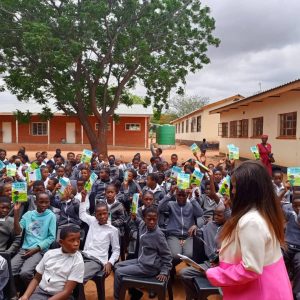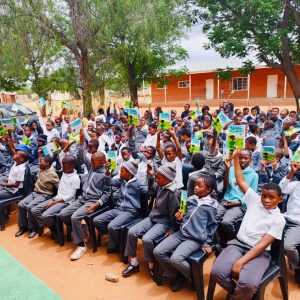By: MKT Correspondent
The fight against gender-based violence (GBV) on children is not just a campaign—it is a moral obligation, a societal duty, and a call to action that must echo through every classroom, playground, and household. Today, as part of the ongoing GBV awareness initiative led by Mulher Forte African Literature and generously supported by the Unitarian International Funding Program in America, we took this message to the heart of education: Mahalapye Primary School, located in Mahalapye, Botswana. The atmosphere was electric with purpose, as learners and educators alike engaged in a transformative dialogue about the realities of abuse and the power of awareness.

Thoughtful and sincere, they welcomed the campaign with open arms. They pledged to continue the conversation, to keep the awareness alive, and to ensure that every child under their care feels safe, heard, and protected. This kind of commitment from educators is the cornerstone of a future free from GBV. It is not enough to teach math and science; we must also teach empathy, boundaries, and the courage to speak out. One of the most critical points raised during the campaign was the issue of privacy. Cultural practices that normalize bathing in front of children or allowing young girls to bathe in public settings must be re-evaluated. Every human being, regardless of age, has the right to privacy. As children grow, especially between the ages of ten and fourteen, they must be granted the dignity of private spaces for bathing and dressing. These are not just matters of comfort—they are matters of safety.
School is more than a place of academic instruction; it is a second home for every child. It is where values are shaped, identities are nurtured, and trust is built. That is why the relationship between teacher and student must be one of openness, safety, and mutual respect. A child should feel free to speak to their teacher about anything—especially when it involves mistreatment at home or elsewhere. This campaign emphasized that teachers are not just educators; they are guardians of emotional and psychological safety. When children know they can confide in their teachers without fear, we create a powerful shield against abuse.
During our session, students were encouraged to respect their teachers and remain focused on their studies, but also to be vigilant. Abuse often hides in silence, and silence is what we must break. The learners were taught to recognize inappropriate behavior, understand the difference between right and wrong touch, and most importantly, to report any form of abuse. The response was nothing short of inspiring. The children listened intently, asked questions, and shared reflections that revealed a deep understanding of the topic. Their engagement was a testament to the excellent work Mahalapye Primary School is doing in instilling behavioral awareness and interpersonal skills.
Teaching children about their bodies, about consent, and about personal boundaries is essential in preventing abuse.

Despite the complexity of the topic, it was deeply moving to witness the children’s efforts to relate to the issues discussed. Their comprehension and communication skills were impressive, and it was clear that they were absorbing the lessons not just intellectually, but emotionally. They understood that GBV is not just something that happens to others—it is something that can happen to anyone, and that they have the power to stop it by speaking up.
Dr. Otukile emphasized the need for complete supervision in all areas where children are present—play centers, streets, schools, and homes. Abuse thrives in unsupervised spaces, in moments when children are left vulnerable and alone. It is our responsibility as adults to ensure that these spaces are safe, that every child is watched over with care, and that any signs of abuse are addressed immediately and decisively.
The campaign concluded with a powerful message to the children: no one has the right to instill fear in order to abuse. Abuse is not discipline. Abuse is not love. Abuse is a violation, and it must be reported. Children were encouraged to identify someone they trust—a teacher, a parent, a relative—and to speak out if they ever feel unsafe. Silence is the abuser’s greatest weapon, and by empowering children to speak, we take that weapon away.
This campaign is not a one-day event. It is a movement. It is a promise to every child that they are seen, they are heard, and they are protected. It is a call to every teacher to be more than an instructor—to be a protector. It is a challenge to every parent to create a home where children feel safe and respected. And it is a reminder to every member of society that GBV on children is not someone else’s problem—it is our problem, and we must solve it together.
As we left Mahalapye Primary School, the echoes of children’s voices filled the air—not with fear, but with hope. They had learned something powerful. They had found their voice. And with that voice, they will change the world.
The teachers, too, played a pivotal role. Their presentation review was thoughtful and impactful, reinforcing the message that they are partners in safeguarding the future.



